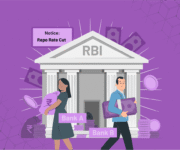The FinTech industry has been evolving quickly over the last decade. 11 of India’s 65 unicorns operate in the FinTech space. The industry is quickly disrupting traditional and established BFSI players. However, the regulatory regime is slowly catching up to technological developments. The RBI has recently released a circular which bans banks from offering credit through a non-bank PPI.
Your Guide to RBI’s Ban on Credit Loading by Non-Bank PPIs
On June 20th 2022, the RBI notified companies offering prepaid payment instruments (PPIs), stating that the RBI’s rules (PPI Master Direction) do not permit users to offer credit services.
The RBI added that if a PPI issuer has been offering such services, they need to stop them as soon as possible. Otherwise, the RBI may proceed with punitive actions as applicable.
In this article, we’ll discuss the ban and its impact on the existing credit card industry.
What Exactly is the Ban on Credit Loading by Non-Bank PPIs
A PPI is a digital wallet or card that allows users to make payments for goods and services. The most popular example is PayTM’s wallet which allows users to deposit money into their wallets and conveniently pay for a wide variety of services (such as mobile recharge, utility bills, etc.)
Currently, many PPI providers are also offering credit or loan services to such users. Usually, the PPI issuer would partner with banks or NBFCs to offer such services.
The Indian FinTech players and stakeholders are confused by the new guidelines. They want further clarity from the RBI and hope the regulator clarifies its position as soon as possible.
To understand the new rules, there should be a distinction between bank and non-bank PPIs. Examples of bank PPIs include ICICI PayLater, SBI Yono, and HDFC Payzapp. In contrast, examples of non-bank PPIs include PayTM, PhonePe, and Google Pay. Therefore, the new notification targets non-banking PPIs, while bank PPIs are exempt from the new rule.
What are the Possible Reasons for the Ban?
A possible reason for RBI’s stance may be to ensure that borrowers comply with all KYC requirements necessary to take credit. For example, the KYC requirements for opening a PPI are much more relaxed than the KYC requirements for taking credit from a bank.
So, in the earlier system, a borrower could simply open an account with a PPI to borrow credit without providing the necessary KYC details that a bank would need.
Further, RBI may be unable to track all lending transactions occurring through PPIs. This is because PPIs are not registered with the RBI as lenders and do not need to follow the disclosure guidelines that banks need to follow.
As of now, PPI providers have been able to issue credit based on the payment capacity of the user. However, with this new rule, the RBI may be aiming to bring such users directly within the cognizance of banks.
Impact on the Credit Card Industry
Industry stakeholders believe that this regulation shows RBI’s intention that core banking activities such as offering credit should remain within the purview of banks. This is because RBI heavily regulates the banks, and they are considered much safer institutions to engage in lending activities
In contrast, PPI issuers are not subject to the same regulations. As a result, it would be difficult to hold them accountable if their lending activity goes south and they cannot return the deposits they have taken from users.
So, we can conclude that this new regulation spells good news for established credit card issuers, banks and credit cards companies such as Visa and Mastercard. However, it may spell trouble for innovative FinTech players.
Critics of the new rule think that RBI’s stance restricts financial inclusion and the movement towards a cashless India.
The Payments Council of India (PCI) has requested the government’s intervention to clarify or revise the new rules. The opinion of the PCI is that PPI providers who fully comply with KYC requirements should be treated on par with banks when it comes to offering credit. The difference should only lie in situations where PPIs do not follow the KYC norms followed by banks when lending.
Further, the PCI contended that PPIs offer greater control over the end-use of borrowed money than lending through cash. This was because PPIs can restrict merchant codes and govern how the money from their wallet is being spent.
Overall, the impact on the existing credit card industry should be positive while emerging FinTech players seek more clarity on the new rules.
Wrapping Up
India’s FinTech industry is on the cusp of large-scale regulatory changes. As the RBI debates the impact of various aspects of the emerging industry, existing players in the FinTech space need to be mindful of their investments amidst regulatory uncertainty.
To know more about the digital lending space, check out our world-focused article here.
If you’re a lending services provider, learn about our services. We offer loan management software which can make your internal operations much easier and more streamlined.




Leave a Reply